15 and 22 May 2014
About
During the school study days, around eighty pamphlets, photographs and books from the library and archive collections at Bishopsgate Institute were used by pupils to carry out a series of structured research activities. These materials were divided into four themed collections: ‘Fashionable London’; ‘Dressing for Work and Play’; ‘Women in the New Workforce’; and ‘The Real People of the Abyss’.
Pupils worked in teams to research, write, illustrate and record one-minute history ‘lectures’ on a theme of their own choosing, inspired by materials from the Bishopsgate Institute archives and informed by content from two mini-lectures by Tailored Trades academics. Pupils’ lectures and illustrations were showcased at the end of the day before being uploaded to the Tailored Trades website.
Some of the items featured are displayed below.
(1) Fashionable London
Pupils were introduced to a range of sources (books, a pamphlet, a street directory and a scrapbook) which informed them about fashionable London in the period from 1880 to 1939.
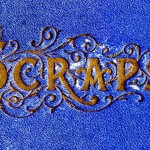
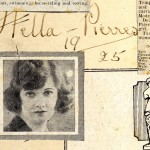
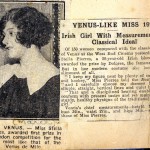
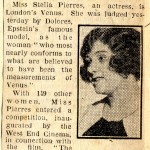
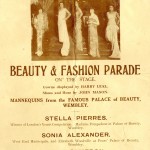
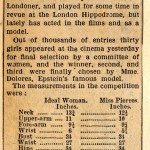
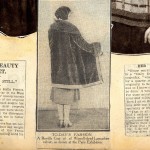
Scrapbook of model Stella Pierres, 1924-1925, London Collection Manuscripts, Bishopsgate Institute
Scrapbook belonging to and created by model Stella Pierres in the 1920s. The scrapbook contains clippings from the Daily Sketch and other dailies featuring Pierres modelling clothing and advertising products, including Pond’s Cold Cream. There is also extensive press coverage of the Modern Venus competition held in London to coincide with the release of the film ‘The Temple of Venus’. The competition aimed to find the woman whose physique most closely conformed to the measurements of Venus. Pierres beat 149 other women to the title.
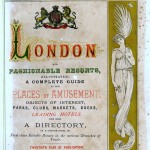
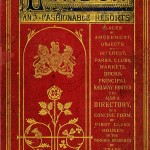
London and Fashionable Resorts, 1891, London Collection, Bishopsgate Institute
This lavishly illustrated and decorated guidebook to London life and amusements was first published c.1871.
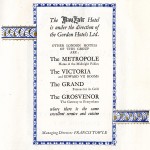
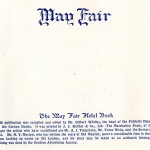
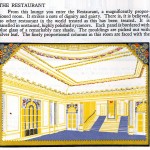
H.V.Morton May Fair: how the site of a low carnival became the heart of fashionable London (1927), London Collection, Bishopsgate Institute
This lavishly-illustrated publication contains extensive promotional material for the Mayfair Hotel.
(2) Dressing for Work and Play
Pupils were given a selection of images showing how people dressed for work and play and invited to start thinking about the links between clothing and lifestyle, status or wealth.
(3) Women in the New Workforce
Pupils were shown archive sources which provided insight into the experiences of girls and women in the workforce from the 1880s to the 1930s. From this pupils discussed the differences between men and women’s experiences in the workforce.
‘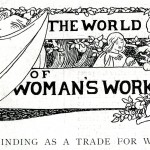
‘Bookbinding as a trade for women’, Worlds’ Work, Volume I, 1903, London Collection Pamphlets, Bishopsgate Institute
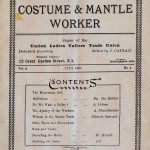
The Costume and Mantle Worker, July 1928, Journals Collection, Bishopsgate Institute
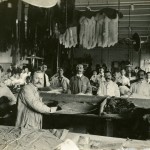
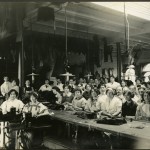
Simon Festenstein & Sons, photograph album, c.1910, London Collection Manuscripts, Bishopsgate Institute
These two images were taken from an album containing eleven photographs of male and female factory workers at wholesale furriers Simon Festenstein & Sons of 33 Banner Street, Bunhill Row, London.
(4) The Real People of the Abyss
Pupils examined pamphlets and photographs which helped them to discover more about the language of poverty and hardship in London around 1900. Pupils were also introduced to Jack London’s People of the Abyss (1903).
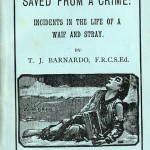
Thomas John Barnardo Saved from a Crime: incidents in the life of a waif and stray (1888), London Collection Pamphlets, Bishopsgate Institute
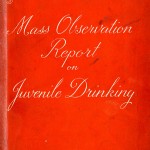
Mass Observation Report on Juvenile Drinking, published by the Livesey-Clegg Youth Club in Sheffield in 1944, London Collection Pamphlets, Bishopsgate Institute
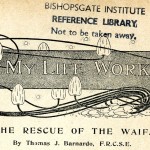
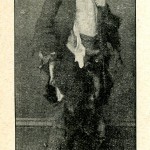
Thomas John Barnardo ‘The Rescue of the Waif’, The Quiver, 1898, London Collection Pamphlets, Bishopsgate Institute
Student Posters
Fashion in London
Fashionable London in the 1900s
Fashionable Women in London
Women, work and clothing
Women and the War
Child Slavery
Rich and Poor